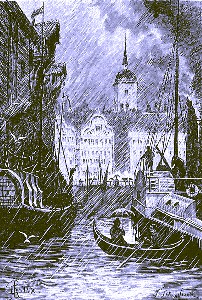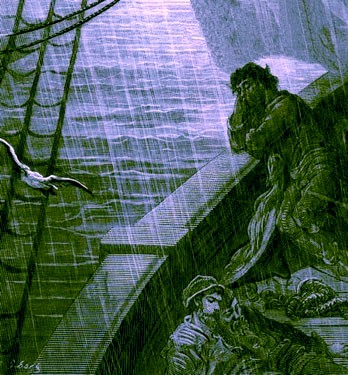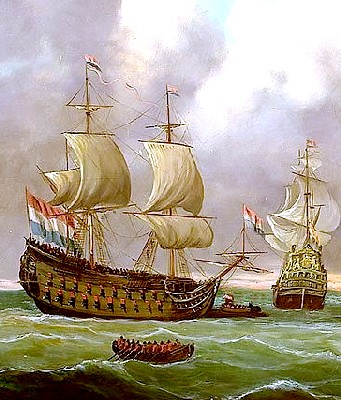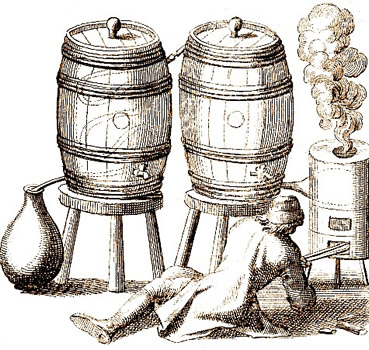
Fresh Water at Sea Page Menu: 1 2 3 4 5 6 7 8 9 Next>>
Fresh Water at Sea in the Golden Age of Piracy, Page 4
Getting Fresh Water - Rain
"We also wanted water, and, had it not been for the help of rain, we had certainly died of thirst..." (Raveneau de Lussan, from The Buccaneers of America, 1856, p. 408)
Collecting rain water seems like an obvious way to collect fresh water at sea. Curiously, there are only a handful of references to it in the period sea literature. When the rain came down in sufficient quantity,

From The Lottery Ticket
By George
Roux (18o86)
just having an open container was enough to gather all the water wanted. Captain Stephen Martin reported that while sailing off New England, they "had hazy, squally weather, with rain, and the 19th [of May, 1696] they shipped much water, which filled both their boats upon deck several times."1
The shortest mention of actually gathering rain on purpose is in some ways perhaps the most telling. Privateer Dutchess captain Edward Cooke mentions in a brief note from late 1708, "much Rain, fill’d our Casks in the Hatch-way"2. The offhand nature of this comment suggests that this was a generally accepted practice; when it rained, you let the water fill the open casks.
Buccaneer William Dampier mentions filling the water casks during a violent storm, noting that it was a "small drizling Rain, but not hard."3 He goes on to explain, "We made a Shift however to save 23 Barrels of Rain-water, besides what we drest our Victuals withal."4 While Dampier doesn't give any detailed information about the way this was done, William Cowley gives an explanation in an account of a voyage with Dampier. He says that during misty weather where the fog 'was as great as a small Rain', "we took up our Water Cask from out of the Main Hatch to the Floor [presumably the main deck] and cleared the Limbers [emptied the channels in the hold in which water collects] amid-Ships. [The next day]... we began to take in our Water for our Voyage."5
Privateer George Shelvocke suggested another method for collecting rain water. He explains, "we chanced to have a heavy shower of rain, which we made the best use of, by catching what we could of it in sheets, blankets, &c."6 Whether they used the sheets and blankets to direct the water into containers or simply wrung them out into something when they became sodden isn't mentioned.
While sailing in the Pacific Ocean off the coast of Panama a group of buccaneers led by Bartholomew Sharp encountered a 'great shower of rain' from which they collected water. Basil Ringrose says, "Hereupon every man saved water for himself, and a great quantity was saved for the whole company."7 It is interesting that Ringrose specifically notes that each man collected water for his own use. How they collected the rainwater isn't explained. In a later entry, Ringrose says "The morning was rainy,

Artist: Gustav Dore
Rain Poured Down, From Rime of the Ancient Mariner (1876)
so that we providentially saved a bompkin
of water."8 A bumkin or bumpkin is a small cask (the name probably being derived from the Middle Dutch word boomekijn, referring to a small barrel9).
When rain is mentioned as a source of drinking water, it is was often a godsend. In Raveneau de Lussan's account of being at sea off Costa Rica, the author comments "had it not been for the help of rain, we had certainly died of thirst"10. While on a voyage off the coast of Argentina in 1687, Lionel Wafer said, "It pleas'd God, during this Exigence [urgent need], to send us a Days Rain, which fell very plentiful; and we sav'd of it several Casks of Water, which was a great Refreshment to us, and made our Men pluck up their Hearts for some time."11
Perhaps the most vivid explanation of collecting rain water is given by Silas Told, an apprentice sailor. He explained that he had never experienced the lack of food and water he met with at sea in one of his first voyages. As a result, "it was the more grievous to be sustained; and had it not been for a heavy shower of rain, off the island of Cuba, we must have perished for want."12 Told gives a very detailed explanation of how this was done. The sailors "stopped up all the scuppers, and saved about six casks of water, by the use of the swabs which we dried the decks with and which we rung into the casks; and although the water was very bitter, yet, providentially, our lives were preserved thereby13. While this water saved their lives, he says it was pretty nasty, probably due to the influence of the swabs, being "full of mud and maggots"14.
Edward Barlow is one of the few sailors to mention that the crew could not drink collected rain water during a voyage across the Atlantic just north of the equator in 1663. "Having many cross winds before we could get out of the rains so that we were forced to go to a quart of water for a man a day, our water growing short and the rain water was not good to keep."15 Seeing that rain water was likely the purest sort of water available, it is is unfortunate that Barlow doesn't explain why this was so.
1 Stephen Martin, The Life of Captain Stephen Martin 1666-1740, Clements Robert Martin, ed., 1895, p. 28; 2 Edward Cooke, A Voyage to the South Sea and Round the World in the Years 1708 to 1711, 1969, p. 20; 3,4 William Dampier, Memoirs of a Buccaneer, Dampier’s New Voyage Round the World -1697-, Dover Publications, Inc., Mineola, NY, 1968, p. 65; 5 William Ambrosia Cowley, “Cowley’s Voyage Round the Globe, A Collection of Original Voyages, William Hacke, ed., 1699, p. 37; 6 George Shelvocke, A Voyage Round the World by Way of the Great South Sea, 1726, p. 353; 7 Basil Ringrose & Alexandre Exquemelin, The History of the Buccaneers in America, 1856, p. 267; 8 Ringrose, p. 306; 9 Raveneau de Lussan & Exquemelin, p. 398; 10 "Bumpkin", Harper Collins English Dictionary, gathered from the internet 6/1/16, Thanks to Benerson Little for pointing me in the right direction on the Authentic Pirate Living History Facebook page; 11 Lionel Wafer, A New Voyage and Description of the Isthmus of America, 1903, p. 194; 12 Silas Told, An Account of the Life, and Dealings of God with Silas Told &c., 1786, p. 14; 13,14 Told, p. 15; 15 Edward Barlow, Barlow’s Journal of his Life at Sea in King’s Ships, East and West Indiamen & Other Merchantman From 1659 to 1703, p. 83
Getting Fresh Water - From Other Ships
Water could also be gotten from ships with an excess when they were encountered at sea. While Edward Barlow
was sailing from Cuba aboard the West Indiaman Guannaboe
in 1677,

Dutch Ships in Convoy (17th century)
they encountered HMS Europa. The two ships sailed together in consort back to England. Barlow reports that the Europa, "being something short in provisions, we spared her five hundredweight of we had bread enough [sic]; but water was very short with us, having gone to a quart a man for twenty-four hours a pretty while, having had a long passage, and so they, having plenty of water, spared us some water."1 Barlow reports another incidence of trading water in 1681 with a vessel he only identifies as a French ship, from which they "got some bread and water from aboard of him."2
William Dampier's ship met buccaneer captain John Eaton in 1683 when both were sailing for Juan Fernandez island. He explains that "we kept Company, and we spared him Bread and Beef, and he spared us Water"3. Similarly, George Shelvocke mentions that they encountered a small bark in May of 1721 which was having trouble landing because of the currents by the shore. As a result, "all his live cattle were almost dead for want of water… upon the hearing of this I took her in tow, and kept the Master of her on board, sending some of my hands to assist them, and spared them as much water and Indian corn as I could."4
In a curiously legitimate pirate adventure, Thomas Pound encountered Isaac Prince's fishing vessel off of Nantucket, pulling his vessel up alongside the fisherman. Hawkins "asked Captain Prince if he had any mackerel and water to spare and then bought eight penny worth of fish and was given three or four gallons of water."5
_Wenceslas_Hollar_17th_c.jpg)
Artist: Wenceslas_Hollar - East Indiamen Tied Together (17th c.)
Of course, legitimately trading for water depended on the other ship having a sufficient supply, something that may not have typically been the coast on the long leg of a voyage such as Barlow's ship was sailing. At the trial of Captain Thomas Green for piracy, it was mentioned that Green's ship "The Worcester supplied the [ship] Aureng-Zeb with fresh water, which occasioned their [the Worcester] sending for more fresh water from the shoar."6 Why the crew of the Aureng-Zeb didn't just get water from shore isn't clear from the document.
Pirates sometimes didn't mind sometimes giving water to one another as another episode from Richard Chivers' career reveals. When Robert Culliford met Chivers near Madagascar, Chiver's ship "Pelican spared Wood, Water, and some of her Hands to Captain Culliford"7. Having similar intent, they decided to sail in consort. While this may seem to have cemented the relationships between the two crews, when the relationships soured, the previous bit of generosity was brought back up. "The Crew of the Pelican expostulated with them, and bid them remember they had spared both Wood and Water, or the [crew of Culliford's ship] Mocha could not could not have kept the station. Instead of any answer, they received a command to be gone, or they would sink them."8 Chivers' crew protested and were finally giving them some water out of a prize and a thousand dollars to buy wood "where they could"9. There really was not much honor among thieves.
1 Edward Barlow, Barlow’s Journal of his Life at Sea in King’s Ships, East and West Indiamen & Other Merchantman From 1659 to 1703, p. 325; 2 Barlow, p 340; 3 William Dampier, A New Voyage Round the World, 1699, p. 84; 4 George Shelvocke, A Voyage Round the World by Way of the Great South Sea, 1726, p. 364; 5 George Francis Dow and John Henry Edmonds, The Pirates of the New England Coast 1630-1730, 1996, p. 55; 6 "The Trial of Captain Thomas Green,* and his Crew, at the High Court of Admiralty of Scotland, for Piracy : 4 Anne, a. d. 1705.", A Complete Collection of State Trials, Vol. XIV, T.B. Howell, ed., 1816, p. 1296; 7,8 Captain Charles Johnson, The History of the Pirates, 1829, p. 192; 9 Johnson, History of the Pirates, p. 193
Getting Fresh Water - Converting Salt Water
As astonishing as it may sound, proposals were made to convert salt water to fresh hundreds of years ago. It goes at least as far back as 1593, when Richard Hawkins purchased his exploratory ship Dainty. He put a distilling device on the ship from which Hawkins said, "I easily drew out of the water of the Sea sufficient quantitie of fresh water to sustaine my people, with little expence of fewell, for with foure billets [probably referring to the space required to house four men] I stilled a hogshead of water,

Distilling Barrels, From Theatrum Chimicum, Table 11, p. 23 (1694)
and therewith dressed the meate for the sicke and whole. The water so distilled we found to be wholesome and nourishing."1
Closer to the golden age of piracy, Nemiah Grew published a book in 1683 advising the use of "an Instrument scarce a yard over, which may stand under the Deck of any Ship, or very well in the Cook-room, and all Smoak and Fire avoided; they can make about ninety Gallons in twenty four hours"2. Grew spent a great deal of his manuscript enthusing over the quality of the water, focusing on its' "Clearness, Thinness, Sweetness, Softness, Lightness, Durableness, and Pureness or Simplicity"3. He also pitched the health benefits of this converted water, noting that "the Water in many other places, where Ships are often forc'd to take it in, is found to be very bad, and to make the men Sick... with Fluxes and Feavers of that ill nature... [and] the anguish of Thirst, [which] it sometimes makes way for divers Diseases, as a Surfeit, Dysenteries, or Cholick"4.
However, modern navy medical historian John Keevil notes that the "promoters [of the distilling machine] struck a far too proprietary and therapeutic note to arouse interest among naval captains. ...[The navy's] lack of interest may also be attributed to a combination of traditionalism with that ‘toughness’ which had always opposed anything savouring of greater comfort."5 So, despite its' possibilities, manufacturing fresh water from the sea seems to have been more of a curiosity than a regular practice during this period.
1 John Keevil, Medicine and Navy, Vol. 1, 1957, p. 103; 2 Nemiah Grew, New experiments and useful observations concerning seawater made fresh according to the Patentee’s invention, 1683, p. 4; 3 Grew, p. 6; 4 Grew, p. 38; 5 John J. Keevil, Medicine and the Navy 1200-1900: Volume II – 1640-1714, 1958, p. 160

